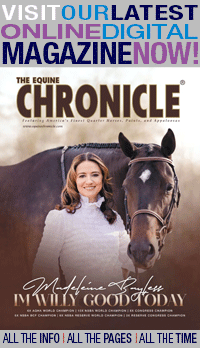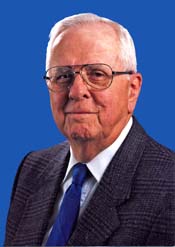Legendary Equine Surgeon, Dr. Charles W. Raker, Has Passed

“I am the light of the world. Whoever follows me will never walk in darkness but will have the light of life.” John 8:12 Photo Credit: Brittany Bevis
Penn Vet press by: Louisa Shepard [February 20, 2014; Kennett Square, PA] – Dr. Charles W. Raker, one of the founding fathers of Penn Vet’s New Bolton Center, died peacefully on February 16. Dr. Raker was a giant of equine veterinary medicine, renowned as a great surgeon, an adroit, gracious teacher, and a compassionate, caring clinician. His professional career spanned 43 years, and even in retirement he remained actively involved at Penn Vet, sharing with students and colleagues the benefit of his matchless wisdom, experience, and understanding for more than 20 years. His contributions to equine veterinary medicine were legion; he was a pioneer, an innovator, and an incomparable leader, having trained many of today’s equine surgeons.
Dr. Raker graduated from Penn Vet in 1942. He was born on July 7, 1920, and grew up in Daylesford in Chester County, PA. He knew from an early age that he wanted to be a veterinarian and spent time working with livestock on a neighbor’s farm, as well as gaining experience with companion animals from the local veterinarian. Dr. Raker spent eight years in private practice following graduation, but in 1950, responded to a request from his alma mater to take the position of Assistant Professor of Veterinary Medicine to boost its livestock and large-animal curriculum. To quote Dr. Raker, “I looked on teaching as a challenge and never looked back.”
When New Bolton Center opened in 1952, Dr. Raker took a “crash course” in surgery at Cornell University, with a focus on large-animal surgery, to help fill a void created by the loss of two veterinary surgeons. He was appointed Chairman of the then Department of Surgery in 1956. In 1967, three years after the construction of the School’s first large-animal hospital on the New Bolton Center campus, he was the recipient of the Lawrence Baker Sheppard Endowed Chair in veterinary surgery – the first in the nation and funded through the generosity of Hanover Shoe Farms, the famous Standardbred breeding and training facility in central Pennsylvania. It was an appointment of which Dr. Raker was tremendously proud.
Dr. Raker was a Charter Diplomate of the American College of Veterinary Surgeons, an organization he helped found in 1965. Over the years he served as its Examination Committee Chair, Chair of the Board of Regents, Vice President, and finally as President from 1975-76.
During the almost 30 years Dr. Raker served as Chief of Large Animal Surgery at New Bolton Center, he introduced new surgical techniques and inspired and mentored countless students, interns, and residents. His mantra for students, house officers, and clinicians alike was, “Remember the three ‘C’s’ – be a caring person, a compassionate person, and remember that communication is vital to success in all things.”
In 1985, the Charles W. Raker Chair in Equine Surgery was established principally through the generosity of longtime clients of New Bolton Center, Mr. and Mrs. Hardie Scott, but significantly augmented by grateful alumni. The Chair honored Dr. Raker for his “seminal contributions to equine surgery and his penchant for mentoring aspiring young faculty.” It is held today by Dr. Dean W. Richardson, Chief of New Bolton Center’s Section of Surgery and a beneficiary of Dr. Raker’s teaching and mentoring expertise.
In addition to honors from Penn Vet, Dr. Raker was recognized by the American Association of Equine Practitioners in 2000 with its Distinguished Educator Award. In 2007, he received the American College of Veterinary Surgeons’ esteemed Foundation Legends Award, given to “an individual who has developed a surgical or diagnostic procedure of significant value, proven by becoming the treatment or test of choice for a given condition.”
Dr. Raker’s achievements in his chosen profession would fill an entire book. Possibly the best way to honor him and pay tribute to all that he has done is to listen to the words of those who knew him and learned from him. The late Olive K. Britt, DVM, was the first female intern-resident in the large-animal clinic at Penn Vet, and was appointed by Dr. Raker. She was also the first female equine practitioner in Virginia and counted among her patients the legendary Secretariat. Dr. Britt said of Dr. Raker, “He was the man most responsible for my success. He fashioned in me the knowledge to become an accomplished equine practitioner. He was at all times available to his students. Even after they graduated, he considered them members of his team. A brilliant, strong leader, he used his abilities in such a gentle, gracious manner that he coaxed from his students their best efforts. He taught me how to talk to clients to lessen their distress and not to offend. He taught me honesty. ‘When you lack an answer,’ he said, ‘tell people you don’t know but that you’ll make every effort to find out.’“
Dr. Midge Leitch, another renowned Penn Vet equine practitioner and teacher, who sadly predeceased Dr. Raker by a day, said of him, “It was Dr. Raker who taught so many of us that professionalism and care go hand-in-hand.” And in a 2012 blog by Sarah M. Khatibzadeh, Class of 2014, Cornell Veterinary School, she observed, “Unlike many veterinarians of his generation, Dr. Raker promoted the inclusion of women in large-animal practice, and mentored the first female large-animal surgical residents…he is a wonderful and inspiring legendary equine surgeon. His professionalism, kindness, and humility are traits to which all veterinarians should aspire.”
Not only a wonderful, exceptional surgeon and teacher, Dr. Raker cared deeply about Penn Vet’s New Bolton Center. He spent much of his retirement “returning some of the honor and opportunity that the School and profession have given me.” This he did by mentoring students, consulting with his former colleagues, and supporting with generous gifts primarily the School’s Opportunity Scholarship program, which was his brainchild, as well as other scholarship funds and large-animal hospital needs. Penn Vet awarded him its prestigious Bellwether Medal for Distinguished Leadership for his many and diverse services to the School.
Gretchen Jackson, a longtime client and supporter of New Bolton Center, and known as the breeder and owner of famed Kentucky Derby winner, Barbaro, said of Dr. Raker, “I loved Dr. Raker so much. As everyone else did. Oh, how he will be missed. There was no one like him.”
Dr. Dean Richardson commented, “The greatest honor I have had in my career is holding the Charles W. Raker endowed professorship here at Penn Vet. To hold a position named after a person so widely admired is an inestimable privilege. He was such a generous and humble man, and one who was so well loved by his clients that it was no surprise to anyone that it took no time at all to get a professorship endowed in his name. Charlie was a remarkably fair, honest, and open-minded person. I called him “Dr. Raker” for well over 20 years, but he finally forced me to stop doing so. No matter what you called him, Charlie Raker was simply a great human being.”
New Bolton Center’s Associate Dean and Executive Director of its large-animal hospital, Dr. Corinne Sweeney, said, “Dr. Raker was a quiet giant, a gentleman, modest and humble, a trusted man of integrity. He was such an important figure in the history of veterinary surgery, and of New Bolton Center, so accomplished and respected worldwide. And yet he was so giving of his time and was so willing to share his talents. He made a lifelong, lasting impression on the students, interns, and residents he trained who have gone on to distinguished careers around the world. What a legacy!”
Dr. Joan C. Hendricks, Dean of the Veterinary School, said, “ I was extremely fortunate to get to know Charlie when I became Dean – although it was my loss that I was not taught by him as a veterinary student. In addition to benefiting from his warmth, wisdom, and connection to Penn Vet and especially its students, I am grateful that he shared generously his insights into leadership, faculty, and the equine community. My favorite memory is of him receiving the award from the AAEP, when the enormous audience expected a frail, elderly figure to say a few words – and he gave a vigorous, patented Raker lecture urging them to action. It was very special, vintage Charlie, and wonderful to see the equine veterinary world share what we at Penn Vet have been able to enjoy for decades. But it still wasn’t enough time. I will miss him every day I am at New Bolton Center.”
Dr. Raker’s influence is hard to quantify – it covers so many aspects of equine veterinary medicine, teaching, and research. But it will live on in perpetuity in the great works of those he taught, and their students. He was above all a great teacher, and it is teaching that can and does change the world.
Dr. Raker’s obituary: http://www.legacy.com/obituaries/dailylocal/obituary.aspx?n=charles-w-raker&pid=169764631











